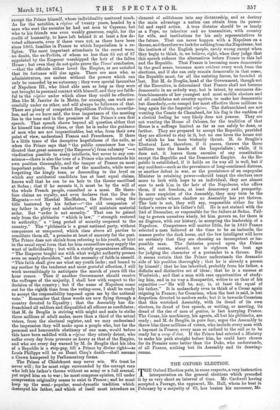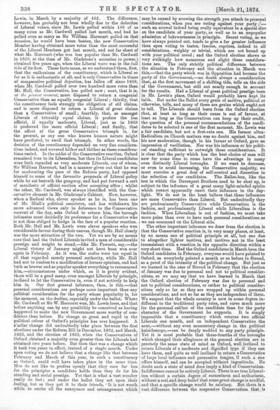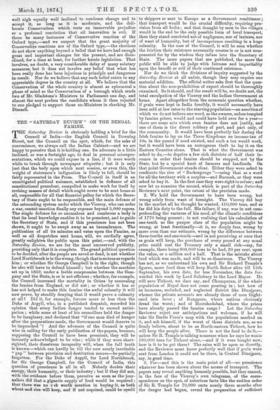THE OXFORD ELECTION.
THE Oxford Election puts, in some respects, a very instructive interpretation on the general elections which preceded it by so very short an interval of time. Mr. Cardwell having accepted a Peerage, the opponent, Mr. Hall, whom he beat in February by a majority of 83, has beaten his successor, Mr. Lewis, in March by a majority of 462. The difference, however, has probably not been wholly due to the defection of Liberal voters, since Mr. Lewis polled within 189 of as many votes as Mr. Cardwell polled last month, and had he polled even as many as Sir William Harcourt polled on that occasion, he would have been beaten, the new Conservative Member having obtained more votes than the most successful of the Liberal Members got last month, and not far short of what Mr. Harcourt (who was less popular than Mr. Cardwell in 1868, at the time of Mr. Gladstone's accession to power,) obtained five years ago, when the Liberal wave was in the full tide of its flow. These facts mean, as we understand them, first, that the enthusiasm of the constituency, which is Liberal so far as it is enthusiastic at all, and is only Conservative in times of comparative political dejection, has fallen off since 1868, when Mr. Cardwell polled over two hundred more votes than Mr. Hall, the Conservative, has polled now ; next, that it is, at the present moment, more disposed to return a congenial Conservative than an equally congenial Liberal ; thirdly, that the constituency feels strongly the obligation of old claims, and is more disposed to return a Liberal of great claims than a Conservative of small ; fourthly, that, as amongst Liberals of tolerably equal claims, it prefers the leas official, if equally moderate, Liberal, just as in 1868 it preferred the more official Liberal ; and finally, that the effect of the great Conservative triumph is, for the present, as any one who knows human nature might have predicted, to swell that triumph. In other words, the decision of the constituency depended on very fine considera- tions indeed, and wavered hither and thither as these considera- tions varied. In the midst of the Conservative reaction, Oxford remained true to its Liberalism, but then its Liberal candidates were both regarded as very moderate Liberals, one of whom, Sir William Harcourt, had in a manner given out that he was for moderating the pace of the Reform party, had opposed himself to some of the favourite proposals of Liberal policy while he sat beneath the gangway, and had put forward a sort of manifesto of official caution after accepting office ; whilst the other, Mr. Cardwell, was always identified with the Con- servative element in Mr. Gladstone's Cabinet. Now, however, when a Radical who, clever speaker as he is, has been one of Mr. Miall's political associates, and has withdrawn his more advanced views only in deference to the Conservative current of the day, asks Oxford to return him, the borough intimates most decidedly its preference for a Conservative who is not thus obliged to hedge in the face of a popular reaction. Bath Mr. Hall and Mr. Lewis were clever speakers who won considerable favour during their canvas, though Mr. Hall clearly was the more attractive of the two. Yet we are by no means sare that had the Oxford Liberals invited a man of considerable prestige and weight to stand,—like Mr. Fawcett, say,—the Liberal victory of January might not have been won over again in February. As it was, the scales were too equal in all that regarded merely personal authority, while Mr. Hall had not to confess to a modification of former opinions, and had both as brewer and as popular speaker everything to recommend him,—circumstances under which, as it is pretty evident, there will be a good many, even amongst Liberals by principle, inclined to let the Conservative in, even if not actively to help
him in. Our first general inference, then, is this,—that personal considerations are perhaps more important than any political consideration for the party whose popularity is, for the moment, on the decline, especially under the ballot. Where Mr. Cardwell or Sir W. Harcourt won, Mr. Lewis loses, and that before anything can by any possibility be conceived as having happened to make the new Government more worthy of con- fidence than before. No change so great and rapid in the political colour of Oxford's principles has ever happened. A inailar change did undoubtedly take place between the first elections under the Reform Bill in December, 1832, and March, 1833, and the election of 1835, when the Conservatives of Oxford obtained a majority even greater than the Liberals had obtained two years before. But then that was a change which it took two years to effect, instead of a single month. Under open voting we do not believe that a change like that between February and March of this year, in such a constituency as Oxford, could well have taken place in the same time. Men do not like to profess openly that they care far less for the principles a candidate holds than they do for his standing and social prestige. Yet that is what a vast number really do feel ; and under the ballot they act upon their feeling, but as they put it to their friends, It is not worth while to excite all the annoyance and estrangement which
may be caused by avowing the strength you attach to personal considerations, when you are voting against your party ;'- such an avowal indeed being really equivalent to a special slur on the candidate of your party, as well as to an unpopular admission of lukewarmness in principle. Secret voting, as we have always pointed out, tends to give a far greater influence than open voting to tastes, fancies, caprices, indeed to all considerations, weighty or trivial, which are not bound up with your political creed ; and the Oxford election shows us very strikingly how numerous and slight these considera- tions are. The only strictly political difference between the situation in February and the situation in March was this, that the party which was in Opposition had become the party of the Government,—no doubt always a consideration that, at the first movement of a shifting tide, tells on the aide of the Government, but still not nearly enough to account for the results. Had a Liberal of great political prestige been in Mr. Lewis's place, Oxford would probably have kept its faith. But under the Ballot every grain of motive, political or otherwise, tells, and many of these are grains which ought not to tell. The Liberals should learn from the Oxford election that, at least so long as their cause is out of favour, at least so long as the Conservatives can keep up their credit, the question of the personal recommendations of the candi- dates to be selected is one of the first moment. Mr. Lewis was a fair candidate, but not a first-rate one. His former ultra- Radicalism on Church matters was no doubt against him, and his new moderation, though in his favour at Oxford, gave an impression of vacillation. Nor was his influence or his politi- cal standing sufficient to outweigh these considerations. It is clear that the party which has the best choice of men will now for some time to come have the advantage in many even distinctly Liberal boroughs. If we want to decrease, or even to avoid increasing, the Conservative majority, we must exercise a great deal of self-control and discretion in the selection of our candidates. The Ballot-box, like the box in which the Davenport Brothers used to be shut up, is subject to the influence of a great many light-minded spirits which cannot apparently exert their influence in the day- light. We do not in the least believe that these influences are more Conservative than Liberal. But undoubtedly they are predominantly Conservative while Conservatism is the fashion, and predominantly Liberal while Liberalism is the fashion. When Liberalism is out of fashion, we must take more pains than ever to have such personal considerations as we can command on the Liberal side.
The other important inference we draw from the election is that the Conservative reaction is, in very many places, at least, by no means one of political principle at all, but one due to altogether lighter motives, and motives not in the least inconsistent with a reaction in the opposite direction within a very short time. Had the Oxford candidates in March been the Oxford candidates in February, everyone would have pointed to Oxford, as everybody pointed a month or so before to Stroud, as a proof of the intensity of the political change. But just as we learned in the case of Stroud in February that the election of January was due to personal and not to political consider- ations, so we may say that we have learned in March that the Oxford election of February was due to personal and not to political considerations, or rather to political consider- ations only so far as they are wrapped up within personal considerations, and not so far as they are independent of them. We suspect that the whole country is now in some degree in- different to the traditional party cries, and cares much more for the personal calibre of the candidate than for the party character of the Government he supports. It is simply impossible that a constituency which returns two official Liberals one month, and an independent Conservative the next,—without any even momentary change in the political kaleidoscope,—can be deeply wedded to any party principle. Yet it is most probable that three-fourths of the boroughs which changed their allegiance at the general election are in precisely the same state of mind as Oxford, well inclined to return Liberals of a moderate and dignified type if they can have them, and quite as well inclined to return a Conservative of large local influence and persuasive tongue, if such a one offers himself, and can be accepted without ingratitude. No doubt such a state of mind does imply a kind of Conservatism. Indifference cannot be actively Liberal. There is no true Liberal- ism without a certain degree of earnestness and enthusiasm, without a real and deep belief that some great change is needful, and that a specific change would be salutary. But there is a vast difference between the suspensive Conservatism that is well nigh equally well inclined to condemn change and to accept it, so long as it is moderate, and the deli- berate Conservatism which rests on immovable prejudice or a profound conviction that all innovation is evil. If there be many instances of Conservative reaction of the Oxford type,—and we suspect that the great majority of Conservative reactions are of the Oxford type,—the elections do not show anything beyond a belief that we have had enough great and important changes for the present, and are disin- clined, for a time at least, for further heroic legislation. That involves, no doubt, a very considerable delay of many salutary measures, but it does not involve any belief that what has been really done has been injurious in principle and dangerous in-result. Nor do we believe that any such belief exists to any appreciable degree in the country at all. We believe that the Conservatism of the whole country is almost as ephemeral a phase of mind as the Conservatism of a borough which sends two of Mr. Gladstone's Ministers to Parliament one day, and almost the next prefers the candidate whom it then rejected to one pledged to support those ex-Ministers in checking Mr. Disraeli.








































 Previous page
Previous page